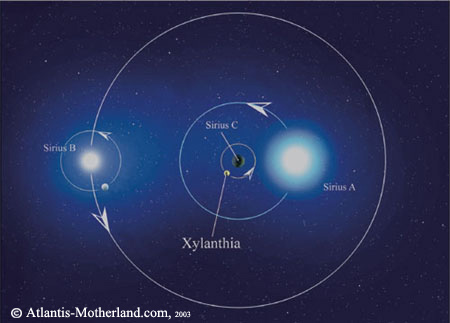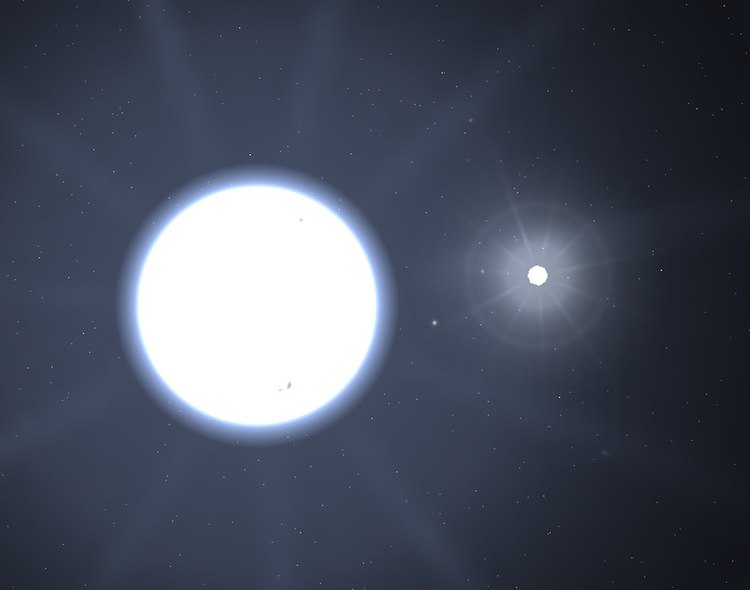西北望,射天狼!
《楚辞·九歌·东君》:
青云衣兮白霓裳,举长矢兮射天狼。
❀
《增补事类赋·星象》:
阙邱三水纷汤汤,引弧矢兮射天狼。
❀
居乐天居士诗《答箭簇》:
寄言控弦者,愿君少留听:何不向西射?西天有天狼;何不向东射,东海有长鲸。
❀

江城子 密州出猎 · 苏轼
老夫聊发少年狂。左牵黄,右擎苍,锦帽貂裘,千骑卷平冈。
为报倾城随太守,亲射虎,看孙郎。
酒酣胸胆尚开张。鬓微霜,又何妨!持节云中,何日遣冯唐?
会挽雕弓如满月,西北望,射天狼。
苏词近年来却遭到一帮学者的诟病。诗中写道“西北望,射天狼”,而天狼星其实并不在西北,而位于南方,因此苏轼不懂天文常识,东南西北不辨。为何一千年来从无任何古人指出苏轼的错误呢?《史记·天官书》言“弧九星,在狼东南,天之弓也。以伐叛怀远,又主备盗贼之奸邪者”。《晋书·天文志》亦曰“弧九星,在狼东南,天弓也,主备盗贼,常向与狼”。也就是说,位于天狼星东南的弧矢九星,就是用来专门应对天狼的。注意到弧乃为弓,矢为其箭;弧矢居天狼东南,则天狼于弧矢西北。现代的这些精英学者的确知道天狼星在南天,却不知 苏轼是指
天狼东南的 天弓神箭,以及张弓搭箭 西北望 射天狼的天神~!(苏轼 ,,,)

《宋史·天文志》引武密语:“天弓张,北兵起”。苏词作于宋神宗熙宁八年,当时侵宋的就是北面辽兵。《宋史·天文志》载:“弧矢九星,在狼东南,天弓也。……流星入,北兵起,屠城杀将。”同书《流陨》篇记:“(熙宁)八年十月乙未,星出弧矢西北,如杯,东南缓行,至烛没,清白,有尾迹,照地明。”这是苏轼写词的当年有关流星的记载。因为历代天文志都与星占有密切关系,流星的记载正应验外兵的入侵。可见,当时天象指北兵,即辽兵入侵。 (张闻玉 · 古代天文历法讲座)


fiction
The planet Xylanthia is located in the Sirius Star System, which is comprised of three stars; Sirius A, B and C. Sirius A and B orbit around Sirius C. Planet Xylanthia orbits around Sirius C, which is a black dwarf star. Xylanthia is the home-planet of the extraterrestrials that visited Earth and founded Atlantis。

天狼星即大犬座α,是全天最亮的恒星。天狼星是由甲、乙两星组成的目视双星。
甲星是全天第一亮星,属于主星序的蓝矮星。
乙星一般称天狼伴星,是白矮星,总质量比太阳略小(98%)
而半径比地球还小(因此同单位质量比太阳的 重的多)它的密度在1000万吨/立方米左右。
它的物质主要处于简并态,平均密度约3.8×10/厘米。
甲乙两星轨道周期为50.090±0.056年,轨道偏心率为0.5923±0.0019。
天狼星与我们的距离为8.65±0.09光年。
古代中国曾经记载天狼星是红色的 是有星体衰变科学根据的。

天狼星

天狼星 (西方称之为 狗星,大狗星), 天体最亮的恒星 天狼星由 A, B 双星组成
Canis Minor 白矮星 white dwarf(伴星, 天狼伴星) 已知天体中 单位质量密度最重的
Canis Major 蓝矮星 blue dwarf(主星, 天狼星)比太阳亮25倍,热2倍,
直径是太阳的1.7倍,重量2.14倍

天狼星(左) 和 太阳(右)



《天官书》是这么记载的

天狼 和 天弓 示意图 (注意:益州,冀州等 位于西北,弓 在其东南)
北极星 Polaris 也被称为Cynosura(狗尾巴),概由小熊星座曾被冠以狗形之故
宇宙的中心 不是 太阳系
有说是 猎户座(Orion)里的 天狼星

著名的埃及金字塔 被证实 是以天狼星为基准和对应而设计的
金字塔的上仰隧道口是正对天狼星的 通天接地

兴趣 苏轼的 密州出猎 词 西北望 射天狼
偶遇 贾鹏芳的 二胡曲 天狼星
想起儿时阅知
假若天狼伴星(白矮星)的一小块儿 被弄到地球上 那是几列火车也拉它不动的
惊奇
做了这个小作品
(^.~)

The planet Sirius is the brightest star in heavens. As a binary star system, Sirius is composed of a bright star, called Sirius A and, around it, in an elliptical orbit, moves Sirius B, the first ever, identified dwarf star. Sirius B orbits around Sirius A, every 50 years, causing Sirius to wobble and appear therefore to sparkle more brightly than any other star. All stars sparkle, but none like this one!
Long before scientists ever knew of its existence, and long before any equipment existed that could verify its position in the heavens, many of the ancient civilizations knew that behind the brilliant star that is Sirius, lay a dark, shadow star - a black star that is much smaller and more intense. The records of these ancient civilisations, as far back as 3,000 years ago, include drawings of the movement of Sirius and it's dwarf, Sirius B. These ancients believed that Sirius was the source of all life, of all energy, and yet detailed knowledge of Sirius and its dwarf star, has only recently been discovered by modern science.
1994 saw two incredible astronomical and celestial occurrences - the Grand Union of Sirius - when Sirius A and Sirius B came as close to each other as they can be - and the re-positioning of Pluto which came into exact alignment with it. Such an event had not occurred in more than 90.000 years and will not reoccur for another 90,000 years. When this rarest of rare alignments took place, the Vortex of Sirius opened.

【小生 撰辑 ☆ 2012-9】
(素材来自网络)
[]